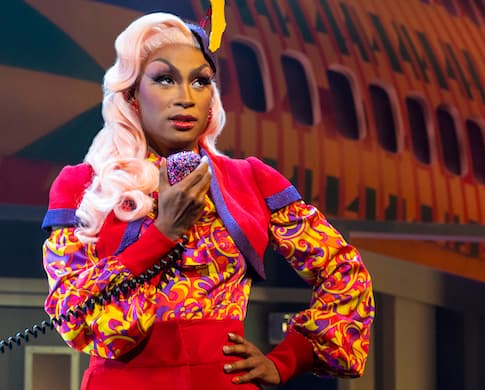Plenty of Laughs Between Nods to Reality in Broadway Satire
The unifying premise in Jordan E. Cooper’s ‘Ain’t No Mo’’ is that Black U.S. citizens have been offered free, one-way tickets to Africa. Those who stay risk facing ‘extreme racial transmogrification.’

When Jordan E. Cooper’s scathing satire “Ain’t No Mo’” had its premiere at the Public Theater more than three years ago, the country had not yet undergone the reckoning that began in earnest following the murder of George Floyd. The deaths of other black men and women had already made headlines and spawned outrage, though, as we’re reminded in the first scene of the play’s new Broadway production — eventually.
This staging begins with a bang, to be certain, but it comes neither from a gun nor a cry of protest. Mr. Cooper, who also performs in the show, kicks things off with a raucous funeral. The date is November 4, 2008, and the deceased — identified as “Brother Right-to-Complain” — has met his fate not at the hands of a police officer but with the presidential election of Barack Obama.
“As of today, we will have no reason to ever walk around with the weight of our ancestors’ tears guiding our face down to the ground,” a pastor assures us, as mourners dressed in white whoop and wail around an ornately decorated coffin. “Ain’t no mo’ getting followed around by the tall white lady in the K-Mart on Jones Street,” he adds, among other exultations that are considerably more graphic and laden with expletives. Audience members — black attendees specifically, at one point — are urged to shout along.
This uproarious passage is one of several supercharged comic vignettes in the play that will be interrupted or tempered by sobering nods to reality. The pastor’s sermon, for instance, is cut short by the sounds of gunshots and sirens, as well as excerpts from news reports on various racially charged tragedies. Brother Right-to-Complain, it seems, may have died prematurely.
The unifying premise in “Ain’t No Mo’” is that Black citizens of the United States have been offered free, one-way tickets to Africa — so that they can, in effect, go back where they came from, to borrow the old bigots’ bromide.
Mr. Cooper appears, in drag, as Peaches, a new employee of African American Airlines charged with making sure the last flight gets off the ground without a hitch. This is no easy task, given both the sheer numbers involved and the ambivalence of certain candidates — even if those who stay risk being faced with “extreme racial transmogrification.” Peaches, dressed to the nines in a fitted red skirt and a blouse blasting primary colors featured on several African flags, seems up to the job, at least initially.
“Tell LaKeisha she don’t need to buy no damn condoms, they got condoms in Africa … yes, they work,” Mr. Cooper’s fierce creation spits into the phone, fielding a personal call. “We got AIDS here too,” she adds. “Stop watching PBS.”
Such irreverence carries into scenes casting five additional actors — among them Marchánt Davis, hilarious as the pastor — as different characters in a motley assortment of settings. One is an abortion clinic, with a waiting list of millions; another is the set of the fictional reality series “Real Baby Mamas of the South Side,” where a posse of women in gloriously garish, glittery attire (Emilio Sosa designed the costumes) dish and bicker for an unseen white producer.
One baby mama identifies as “trans-racial”; born white, Rachel — or Rachonda, as she has come to call herself — is undergoing a series of procedures involving “an unfavorable amount of cocoa butter and hot sauce” to change her race. Another cast member isn’t having it. “You are not a real black woman,” she tells Rachel; the debate that ensues, while amusing, raises questions in our current climate: What if Rachel had wanted to change her gender instead of her race? Would there have been the same laughing and occasionally hissing at her that I heard at the performance I attended?
The most poignant scene in “Ain’t No Mo’” takes place in jail, where three prisoners await release granted on the condition that they board that airplane. The last to leave, a sullen woman played by Crystal Lucas-Perry, who’s excellent in several roles, insists that all the “stuff” she gave up upon entering prison hasn’t been returned. A female officer, perhaps realizing she’s referring to more than physical possessions, tries to reassure her: “You can find yourself some new things…. They’re giving us all freedom, and they’re making sure you get a taste of your own.”
Even as it sends up enduring injustices, then, Mr. Cooper’s play acknowledges and celebrates agency — and provides plenty of laughs in the process.

